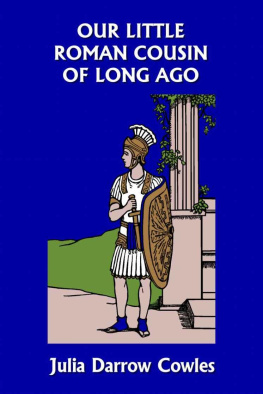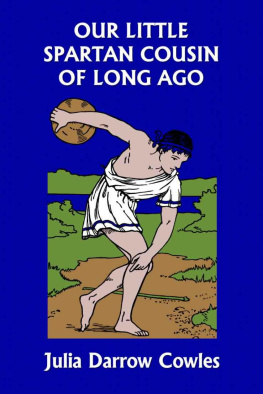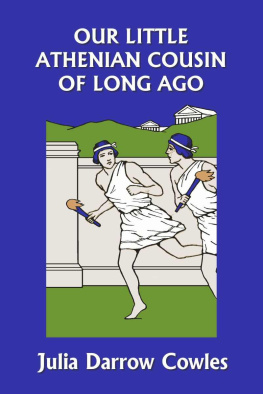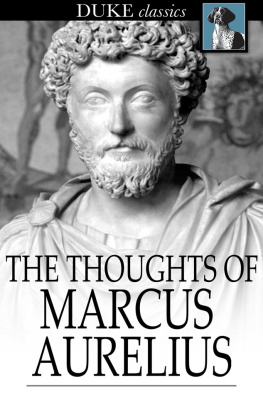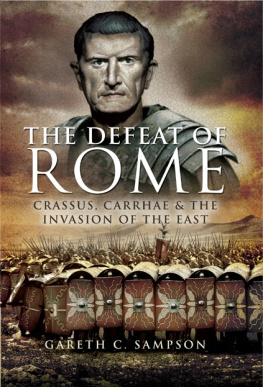Our Little Roman Cousin of Long Ago
by
Julia Darrow Cowles
Yesterday's Classics
Chapel Hill, North Carolina
Cover and Arrangement 2010 Yesterday's Classics, LLC
All rights reserved. No part of this book may be reproduced or retransmitted in any form or by any means without the written permission of the publisher.
This edition, first published in 2010 by Yesterday's Classics, an imprint of Yesterday's Classics, LLC, is an unabridged republication of the work originally published by L. C. Page and Company in 1913. This title is available in a print edition (ISBN 978-1-59915-285-1).
Yesterday's Classics, LLC
PO Box 3418
Chapel Hill, NC 27515
Yesterday's Classics
Yesterday's Classics republishes classic books for children from the golden age of children's literature, the era from 1880 to 1920. Many of our titles are offered in high-quality paperback editions, with text cast in modern easy-to-read type for today's readers. The illustrations from the original volumes are included except in those few cases where the quality of the original images is too low to make their reproduction feasible. Unless specified otherwise, color illustrations in the original volumes are rendered in black and white in our print editions.
Preface
The story of Marcus is laid during the closing days of the Roman Republic, when conservative members of the nobility still held to the sturdy habits and to the simplicity of worship of earlier times. Every incident of the story has an authentic basis in Roman history and custom.
If the story serves, in later years, to make the important study of Roman history more vital and real to its readers, the purpose of its author will have been accomplished.
Acknowledgment is hereby made to the authors of the following books, for the foundation upon which the story of Marcus rests: "Private Life of The Romans," by Harold Whetstone Johnston; "Private Life of The Romans," by Harriet Waters Preston and Louise P. Dodge; "Roman Education," by A. S. Wilkins, Litt. D.; "Education of Children At Rome," by George Clarke, Ph. D.; "Story of The Roman People," by Eva March Tappan; "City of The Seven Hills," by Caroline H. Harding, A. B., and Samuel B. Harding, Ph. D.; "Social Life At Rome," by W. Warde Fowler, M. A.
Contents
CHAPTER I
Going to School
"C OME, Marcus; come, Lucius; no more sleep this morning, or the cocks will be crowing before you are in school."
Marcus turned, and bounded quickly from his couch to the floor.
"I wish the cocks did not crow so early in the morning," yawned Lucius, sleepily.
"Come, come," said his mother, "a boy that is old enough to go to school, is old enough to waken early."
Lucius sat up quickly. The great regret of Lucius' life was that he had not been born on the same day as his brother Marcus, instead of six years afterward. Marcus could do so many fine things that he could not. But this year he had entered the school to which Marcus went, and he was very proud of the fact.
Slipping over the edge of the high couch upon which he had been sleeping, Lucius dropped to his feet with a thud. Marcus never used the stoolwhich stood beside each high Roman bedand Lucius did not intend to either, now that he was big enough to go to school.
The two boys were quickly dressed, for they had only to slip into their tunics, which were like extra long sweaters without sleeves.
They were soon in the atrium, or main living-room, of the home. There they found Glaucon, the tall Greek slave who always accompanied them upon the street.
"Be sure, Marcus, to stop at the little bake-shop and buy some cakes for your breakfast," said Gaia, their mother, as they started off.
It was still dark, and the boys carried lanterns to light them along the way.
All up and down the streets of Rome, bobbing, sputtering little lights showed that many other boys were on their way to school.
"Good, here is Tullius!" cried Marcus, as he met, at a corner, the boy friend whom he liked best of all.
Behind Tullius was Aulus, the slave, or pedagogue, who always accompanied him upon the streets, as Glaucon did Marcus.
The three boys went on together and the two slaves followed. When they reached the bake-shop the boys bought a light breakfast, to eat at school.
Glaucon and Aulus were glad to be together. Although slaves, they were both educated men who had once been free citizens of Greece.
After a battle with the Greeks, Glaucon and Aulus were taken captive and brought to Rome. There they were sold in the slave market of the city.
Gaius, the father of Marcus and Lucius, paid a large sum of money for Glaucon, for he learned that he was an educated man, and a man of good character. Quintus, the father of Tullius, bought Aulus for the same reason.
Every Roman boy of good birth had a special slave who went with him to and from school, and to all public places of the city. If well educated, this slave also helped him with his lessons outside of school. For this reason he was called the boy's pedagogue.
The pedagogue held a very important place in a Roman household. Marcus and Lucius were fond of Glaucon, and Tullius was fond, too, of Aulus.
As the boys hurried along the streets with their lanterns, Marcus saw a big notice posted upon the wall of a house.
He held up his lantern to read.
"It is a notice of the chariot races that are to be held in the Circus Maximus," he said. "There will be six drivers, and each will drive four horses. It will be a fine race."
Tullius was now reading the notice, too. "One of the drivers has won more than two thousand victories!" he exclaimed. "My, what a lot!"
"I wish I could see a chariot race," said Lucius. "You have seen more than one, haven't you, Marcus?"
"Yes," answered Marcus, "and you will see one some of these days, too."
"We had better hurry on," cried Tullius suddenly, "or we shall be late for school."
"And the master may flog us," said Lucius.
"But, even at that," said Marcus laughingly, "we do not have so hard a master as the school boys of Falerii."
"Is it a story, Marcus? Oh, do tell it to us," begged Lucius, for Marcus was a famous story-teller among the boys.
"Well," said Marcus, as they started on, "there was a great battle many, many years ago between the Romans and the Etruscans. The Romans had taken many towns belonging to the Etruscans, but the town of Falerii stood upon a high cliff with great ravines on each side.
"Camillus was the general in charge of the Roman army. His soldiers had gone into camp and were wondering day after day how they ever were to conquer a city built upon such a site as that.
"But one morning, while the officers were planning and the soldiers were talking, they saw a strange company making its way down the cliff and straight to the door of Camillus' tent. The company was made up of a group of boys with one man apparently in charge of them.
"When Camillus came out to greet them, the man stated that he was a schoolmaster in Falerii, and that the boys were his pupils.
" 'They are sons of the foremost men of the town,' he said, 'and I have come to deliver them into your hands. For you may be sure,' he added, 'that when their fathers learn what has become of these boys, they will surrender their city to you, rather than let their sons be carried away as slaves.' "
"Oh, what a horrible schoolmaster!" exclaimed Lucius.
"Yes," said Marcus, "he thought that he would be given a great prize for his act. But Camillus was a true Roman general, and he would not stoop to anything so low as that.

